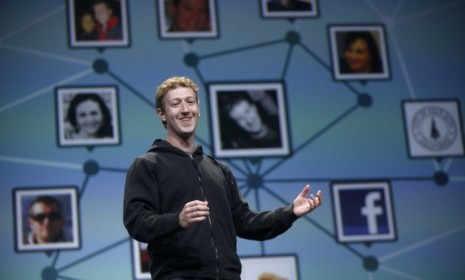Does Facebook make your brain bigger?
Research finds that people with more connections on Mark Zuckerberg's social network have bigger amygdalae than those with skimpy friend rosters

A free daily email with the biggest news stories of the day – and the best features from TheWeek.com
You are now subscribed
Your newsletter sign-up was successful
Time to start making more Facebook friends? New research reveals a connection between the size of your brain and the number of friends you have on the ubiquitous social network. Published in the journal Proceedings of Royal Society B, the study indicates that brain areas associated with memory and emotional response are bigger for people with more connections on the 800-million-user social network. Here's what you should know:
How was this study conducted?
Ryota Kanai, the University College in London researcher who led the study, examined 165 students between the ages of 19 and 28. The college students had their brains scanned by MRI, and their brain sizes were then cross-referenced to the number of friends that the students have in the real world and on Facebook. "The most surprising thing," Kanai says, "is that there was any correlation at all."
The Week
Escape your echo chamber. Get the facts behind the news, plus analysis from multiple perspectives.

Sign up for The Week's Free Newsletters
From our morning news briefing to a weekly Good News Newsletter, get the best of The Week delivered directly to your inbox.
From our morning news briefing to a weekly Good News Newsletter, get the best of The Week delivered directly to your inbox.
So... Facebook makes our brains bigger?
Not exactly. Facebook doesn't necessarily cause brains to be bigger — and it was only certain parts of the students' brains, not their brains as a whole, that appeared larger than the norm. Researchers found "that those [students] who are more social in general tend to have larger amygdalae than their peers," says Graeme McMillan at TIME. The amygdala is the part of the brain that monitors emotional reactions. And people who are more social on Facebook "have increased sizes of the right superior temporal sulcus, the left middle temporal gyrus and the right entorhinal cortex," which deal, respectively, with emotions, social cues, and memory.
Why is this?
It's unclear. It's possible that Facebook changes the way our brains are wired, suggests Nidhi Subbaraman at Fast Company. But the more likely explanation is that people who acquire more Facebook friends have brains "that came equipped with better friend-making tools" in the first place.
A free daily email with the biggest news stories of the day – and the best features from TheWeek.com
What's next?
Social networks like Facebook are "massively influential, yet we understand very little about the impact they have on our brains," says study co-author Geraint Rees. "This has led to a lot of unsupported speculation that the internet is somehow bad for us." But maybe the internet is actually good for our brains. Further research should help to clarify the picture.
Sources: TIME, Fast Company, ABC News
-
 5 blacked out cartoons about the Epstein file redactions
5 blacked out cartoons about the Epstein file redactionsCartoons Artists take on hidden identities, a censored presidential seal, and more
-
 How Democrats are turning DOJ lemons into partisan lemonade
How Democrats are turning DOJ lemons into partisan lemonadeTODAY’S BIG QUESTION As the Trump administration continues to try — and fail — at indicting its political enemies, Democratic lawmakers have begun seizing the moment for themselves
-
 ICE’s new targets post-Minnesota retreat
ICE’s new targets post-Minnesota retreatIn the Spotlight Several cities are reportedly on ICE’s list for immigration crackdowns